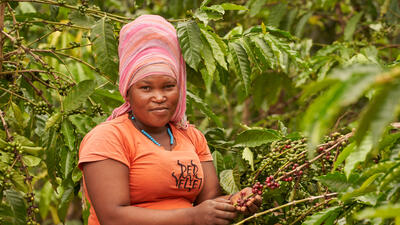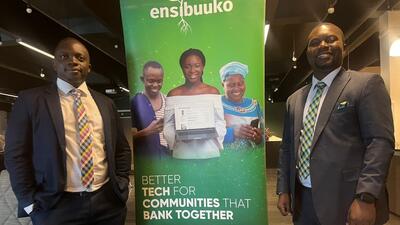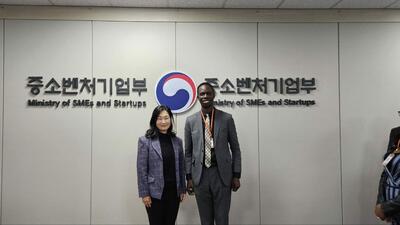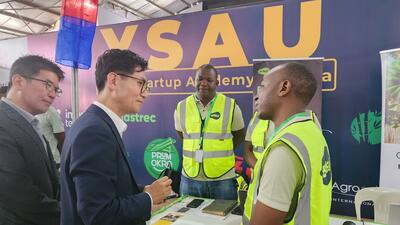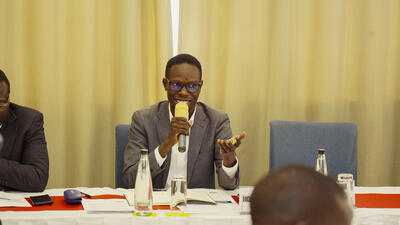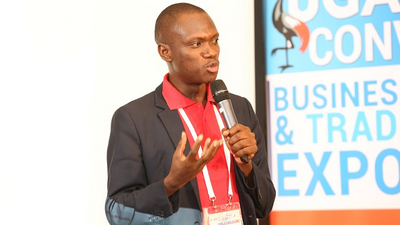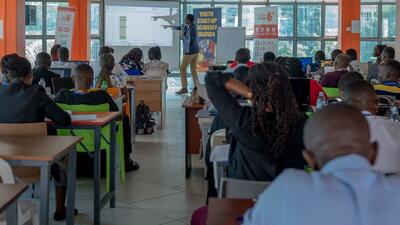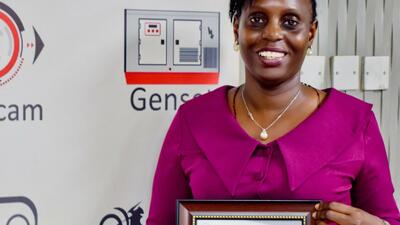Improving lives with better coffee in Uganda
Joseph Mayanja knows about raising things, whether it involves children or coffee plants. The long-time farmer from Masaka, Uganda, is father to 13 children, including two adopted orphans. At 71, he is still able to provide for seven of his youngest children by growing coffee on his 2.3-acre farm.
‘Paying school fees was a burden, but now there is a light. Before, when we didn’t grow enough coffee, we could not get enough to even care for the home. But now, it’s worthwhile,’ he said.
The beans that Mayanja harvests today are ‘bigger and weighty’ compared with the beans he used to grow before he received training from the National Union of Coffee Agribusinesses and Farm Enterprises (NUCAFE), as part of ITC’s Netherlands Trust Fund (NTF) II Uganda coffee project, funded by the Dutch government.
Through the training sessions, Mayanja learned to prune coffee plants, use fertilizer, pick beans in a way that preserves the branches, dry the beans on clean tarpaulins and properly store them before sending them for processing. The result is higher-quality beans that sell at more than four times the previous price.
‘Our farmer ownership model helped ensure that we move to another level in the coffee value chain,’ said NUCAFE Executive Director Joseph Nkandu. ‘Farmers have graduated from selling raw-material coffee to a more value-added coffee. [This is] about empowering farmers, not living on handouts.’
Before partnering with NUCAFE, Mayanja said he sold 60-kilogramme bags of unprocessed coffee at about 1,000 Uganda shillings, or US$ 0.40, per kilogramme. He now sells 40-kilogramme bags of processed coffee at 4,350 Uganda shillings, or US$ 1.73, per kilogramme. Mayanja is among the thousands of people who benefited from the NTF II coffee project last year. Throughout the project, more than 5,000 farmers received training on verification of the 4C Code of Conduct, the coffee sector’s baseline standard for sustainability.
Mayanja now earns enough to pay for school fees, medical care and household needs, and can pay for special occasions, such as wedding parties and church pledges.
Mayanja has a bank account – something that was not possible until he began attending ITC and NUCAFE trainings to learn to grow better-quality beans, sell them at higher prices and keep track of finances. After various training sessions, he and his family were able to develop a five-year plan with a list of goals, such as buying a computer to keep electronic records of all transactions, building a large coffee storage facility, buying a water pump for irrigation and investing in a soil testing kit.
‘They are moving towards doing farming as a business,’ said Kakooza Hassan, Business Manager of the Masaka Coffee Hub. ‘They are becoming farmers who focus on making a profit and on differentiating expenditure and income, because now they can do record-keeping.’
Farmers gaining access to finance was one of the most important results of the project, according to NUCAFE Deputy Executive Director David Muwonge.
Independent financial counsellors trained by ITC worked with 40 farmers’ associations, representing around 8,000 farmers, to develop bankable business plans, which the associations submitted to local banks. At least 15 associations were able to secure credit, ensuring that they have continuous financing even between the major coffee seasons.
One farmers’ association that meets at the Masaka Coffee Hub secured a loan of 22 million Uganda shillings in 2011, then a loan of 40 million Uganda shillings in 2012 and 75 million Uganda shillings in 2013.
The projected loan amount for next year is 100 million Uganda shillings, according to Muwonge. ‘This is not only access, but also growth in terms of the volume of funds they are accessing from banks,’ he said.
Securing loans like these enables NUCAFE to offer farmers advance cash payments, which changes the game because traders or middlemen have traditionally had the benefit of having cash at hand to buy farmers’ coffee beans, often at prices that were unfairly low.
Now that farmers’ associations are gaining access to finance, farmers have more of an incentive to join associations and work with other farmers to collectively sell their beans at higher prices. They are also tapping NUCAFE’s expertise in marketing and branding to increase coffee sales.
The number of farmers’ associations has grown from fewer than 125 before NTF II to 155 by the end of the project in March 2013. Since the project ended, this number has increased to 165 associations since then. NUCAFE is segmenting the associations to better serve them according to their size.
At the start of NTF II, NUCAFE had one big coffee buyer, Caffè River in Italy. By the end of the project, NUCAFE was selling to six buyers. Today, there are 12 coffee companies from around the world buying NUCAFE’s coffee.
The aim of NTF II was to strengthen NUCAFE’s ability to train and support farmers to become self-sustaining entrepreneurs and exporters. Uganda is now the leading African coffee exporter in the world after overtaking Ethiopia. The sector directly employs about 3.5 million people. Improving the livelihoods of the farmers through increases in productivity and efficiency can make a difference in many people’s lives.
‘Coffee is a strategic crop. Once you empower coffee farmers, then you have empowered the nation,’ said James Kizito-Mayanja, the Principal Information Officer at the Uganda Coffee Development Authority. ‘That is an intervention that will go a long way in improving the economy of Uganda and ultimately, reduction in poverty levels.’





